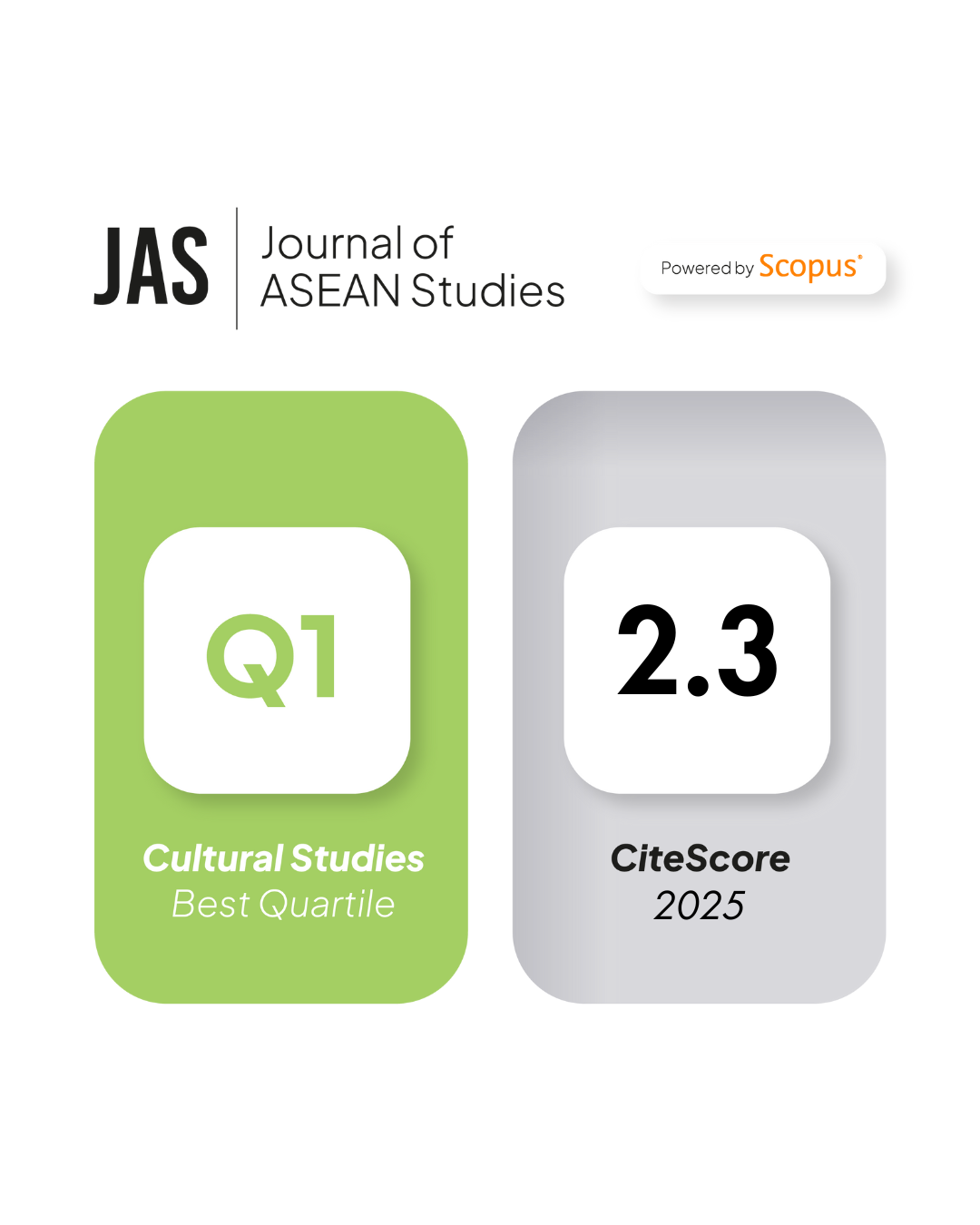Indonesia’s Response in the South China Sea Disputes: A comparative analysis of the Soeharto and the post-Soeharto era
DOI:
https://doi.org/10.21512/jas.v3i1.749Keywords:
South China Sea, Dispute, Indonesia, China, ASEANAbstract
Before it developed into a dispute among China and Southeast Asian nations, the South China Sea has been disputed long before it became what it is today. The post-World War II era brought a fresh start to a new chapter of dispute, as China, Taiwan, Vietnam, the Philippines, Malaysia, and Brunei Darussalam laid their claims one by one. This study contends that under Suharto’s iron fist rule, Indonesia’s interest to the South China Sea dispute grew from maintaining Indonesia’s territorial integrity to maintaining domestic stability. The former took shape after being threatened by China’s map which claimed a part of the former’s territorial waters, while the later grew in through establishing deeper trade cooperation with China. Despite the half-hearted normalization with China, Indonesia managed to establish a track-two forum for parties involved in the South China Sea dispute, which is later proven to be instrumental. Under President Yudhoyono, Indonesia gradually played its initial role from a passive into an active honest broker, which brought improvements to the process. This research attempts to show that constraint to Indonesia’s role in the South China Sea dispute originates from both the ideological and historical factors. Indonesia’s long-running ideological constraints set its priorities to its interest to the dispute, while its foreign policy doctrine serves as a pragmatic means to achieve its goals of interests. Indonesia’s past relationship with China also played a part in influencing Indonesia’s response which later evolved as the relations went through ups and downs. Moreover, the unclear integration process of ASEAN sets the task of the honest broker became a one-country-show for Indonesia.References
Books
Djalal, Dino Patti, 2008, Harus Bisa! Seni Memimpin Ala SBY: Catatan Harian Dino Patti Djalal, Red & White Publishing, Indonesia.
O’Rourke, Kevin, 2002, Reformasi: The Struggle for Power in Post-Soeharto Indonesia, Allen & Unwin, New South Wales, Australia.
Sukma, Rizal., 1999, Indonesia and China: the Politics of a Troubled Relationship, Routledge, London, UK.
Soebagjo, Natalia, 2008, “Ethnic Chinese and Ethnic Indonesians” in Suryadinata, Leo, 2008, Ethnic Chinese in Contemporary Indonesia, Institute of Southeast Asian Studies, Singapore.
Journals
Emerson, Donald K., “Security, Community, and Democracy in Southeast Asia: Analyzing ASEAN”, Japanese Journal of Political Science, Vol. 6, No. 2 (2005)
Johnson, Douglas, “Drawn into the Fray: Indonesia’s Natuna Islands Meet China’s Long Gaze South”, Asian Affairs, Vol. 24. No. 3, (1997)
van der Kroef, Justus M., “"Normalizing" Relations with China: Indonesia's Policies and Perceptions”, Asian Survey, Vol. 26, No. 8 (1986)
Moorthy, Ravichandran and Benny, Guido, “Is an ‘ASEAN Community’ Achievable? A Public Perception Analysis in Indonesia, Malaysia, and Singapore on the Perceived Obstacles to Regional Community”, Asian Survey, Vol. 52, No. 6 (2012)
Panglaykim, J. and Thomas, K. D., “The New Order and the Economy”, Indonesia, Vol. 3, (1967)
Sukma, Rizal, “Indonesia-China Relations: The Politics of Re-engagement”, Asian Survey, Vol. 49, Issue 4. (2009)
Online
“ABRI Chief Opens Third ABRI Military Joint Training, No Intention to Show of Force”, IMN.co.id, 4 September 1996, archived and retrieved from http://www.library.ohiou.edu/indopubs/1996/09/04/0064.html
“Chinese in Indonesia not second-class citizens: Wahid”, archived from Kyodo News Agency (1999) retrieved from http://www.thefreelibrary.com/Chinese+in+Indonesia+not+second-class+citizens%3A+Wahid.-a058184061
“Kenapa Gus Dur Ingin Kerjasama dengan Israel? Ini Jawaban Yenny Wahid”, Tribun News, 10 March 2013, retrieved from http://lampung.tribunnews.com/2013/03/10/kenapa-gus-dur-ingin-kerjasama-dengan-israel-ini-jawaban-yenny-wahid
“Pangab Buka Latgab ABRI di Natuna: Tak Ada Maksud Unjuk Kekuatan”, Republika Online, 3 September 1996, retrieved from http://www.library.ohiou.edu/indopubs/1996/09/03/0025.html
“Usai Mengunjungi Timur Tengah, Gus Dur Puas”, retrieved from http://news.liputan6.com/read/9223/usai-mengunjungi-timur-tengah-gus-dur-puas
Abdul Khalik and Desy Nurhayati, “South China Sea Guidelines Agreed,” The Jakarta Post, 21 July 2011, retrieved from http://www.thejakartapost.com/news/2011/07/21/south-china-sea-guidelines-agreed.html
Abraham Cooper, “Abdurrahman Wahid: The Blind Man with 20/20 Vision”, retrieved from http://www.huffingtonpost.com/rabbi-abraham-cooper/abdurrahman-wahid-the-bli_b_407731.html
Amahl S. Azwar, Govt Looks to Approve East Natuna Bid, retrieved from http://www.thejakartapost.com/news/2013/08/14/govt-looks-approve-east-natuna-bid.html
Bayu Sutiono and Joni Akbar, “Usai Mengunjungi Timur Tengah, Gus Dur Puas”, retrieved from http://news.liputan6.com/read/9223/usai-mengunjungi-timur-tengah-gus-dur-puas
Carlyle A. Thayer, “ASEAN’S Code of Conduct in the South China Sea: A Litmus Test for Community-Building?”, Asia-Pacific Journal, Vol.10, No.4, 4 August 2012, retrieved from http://www.japanfocus.org/-Carlyle_A_-Thayer/3813
Eddy Suprapto, Budi Arie Setiadi, Ahmad Febrian, Hendrika Yunapritta, and Titis Nurdiana “Bung Rudy, Ini Rapormu! Mengintip Pertanggungjawaban Presiden B.J. Habibie”, retrieved from http://web.archive.org/web/20060915192202/http://www.hamline.edu/apakabar/basisdata/1999/10/15/0052.html
Harian Ekonomi Neraca, 2013, “Era Tinggal Landas atau Tinggal di Landasan”, retrieved from http://www.neraca.co.id/harian/article/28883/Era.Tinggal.Landas.atau.Tinggal.di.Landasan
Hasjim Djalal, Managing Potential Conflicts in South China Sea: Lessons Learned, retrieved from http://www.asean.org/archive/arf/9ARF/Preventive-Diplomacy/Doc-7.pdf
International Trade Center, “List of partners markets for a product commercialized by Indonesia Product: TOTAL All products,” retrieved from http://www.trademap.org/Country_SelProductCountry_TS.aspx
John Hughes, Islamic Extremism and the War of Ideas: Lessons from Indonesia, (Stanford: Hoover Institution Press, 2010) p. 82 retrieved from http://media.hoover.org/sites/default/files/documents/Islamic-Extremism-and-the-War-of-Ideas_Part-3.pdf
KPU’s (General Election Commission) website: http://www.kpu.go.id/index.php?option=com_content&task=view&id=42
Lisa Pease, JFK, Indonesia, CIA and Freeport Sulphur, retrieved from http://www.realhistoryarchives.com/collections/hidden/freeport-indonesia.htm
Mohammad Taufik, “Perjuangan Gus Dur untuk Etnis Tionghoa”, Merdeka, 26 December 2013, retrieved from http://www.merdeka.com/peristiwa/perjuangan-gus-dur-untuk-etnis-tionghoa.html
Nadia Bulkin, “Indonesia’s Political Parties”, Retrieved from http://carnegieendowment.org/2013/10/24/political-parties/gr88?reloadFlag=1
Peter Mares, “The Unlikely Leader”, retrieved from http://www.eurekastreet.com.au/articles/0205mares.html
Richard Woolcott, Suharto as I Knew Him, retrieved from http://www.theaustralian.com.au/archive/news/suharto-as-i-knew-him/story-e6frg6t6-1111115411625
Yayan G.H. Mulyana lecture on Indonesia’s Foreign Policy in the Reformasi Era, Singapore 29 July 2011. Notes on the seminar retrieved from http://www.rsis.edu.sg/Indonesia_Prog/resources/transcript/Seminar%20Notes%20-%20Dr%20Yayan%20Mulyana.pdf

























